Got contracts to review? While you're here for policies, let Cobrief make contract review effortless—start your free review now.

Customize this template for free
Workplace romance policy (Texas)
This workplace romance policy is designed to help Texas businesses establish clear guidelines regarding romantic relationships between employees. The policy outlines the company's stance on workplace romance, the potential risks associated with such relationships, and how to handle conflicts of interest, harassment claims, and other issues that may arise from personal relationships in the workplace.
By adopting this policy, businesses can mitigate risks related to workplace romances, maintain professionalism, and foster a positive and respectful work environment for all employees.
How to use this workplace romance policy (Texas)
- Define workplace romance: Clearly define what constitutes a workplace romance, including romantic relationships between employees, relationships between managers and subordinates, or relationships involving employees and third parties (e.g., clients or contractors).
- Establish a disclosure process: Specify whether employees are required to disclose their romantic relationships to the company. The policy should outline the circumstances under which disclosure is necessary, such as when the relationship could lead to a conflict of interest or impact work performance.
- Set guidelines for relationships between supervisors and subordinates: Clearly outline whether relationships between supervisors and their direct reports are permitted, and if so, how they will be managed. The policy should address potential conflicts of interest, favoritism, and any steps that will be taken to ensure fairness and professionalism.
- Address harassment and conflict of interest: Specify that romantic relationships should not interfere with professional behavior or create a hostile work environment. The policy should address potential harassment claims, such as unwanted advances, and the importance of maintaining a respectful and professional atmosphere at all times.
- Provide options for conflict resolution: Offer a process for addressing conflicts or issues arising from workplace romances, such as mediation or alternative reporting structures to avoid conflicts of interest or accusations of favoritism.
- Set boundaries for public displays of affection: Establish guidelines for appropriate behavior in the workplace, such as prohibiting excessive public displays of affection or physical contact that could make other employees uncomfortable.
- Include consequences for policy violations: Outline the consequences for employees who violate the workplace romance policy, which may include disciplinary action, reassignment, or termination if the relationship creates a disruptive or unsafe work environment.
- Enhance legal compliance: Ensure the policy complies with Texas state laws, federal anti-discrimination laws, and harassment regulations, which protect employees from unfair treatment based on their romantic relationships.
Benefits of using this workplace romance policy (Texas)
This policy offers several benefits for Texas businesses:
- Mitigates legal risks: By establishing clear guidelines for workplace romances, businesses can reduce the risk of legal issues related to harassment, discrimination, or conflicts of interest.
- Promotes a professional work environment: The policy helps maintain professionalism in the workplace by ensuring that personal relationships do not interfere with work performance or create conflicts.
- Reduces conflicts of interest: By addressing potential conflicts, such as supervisor-subordinate relationships, the policy helps prevent issues related to favoritism or unfair treatment.
- Protects employee well-being: The policy helps create a respectful and inclusive work environment where employees feel safe and supported, even if their coworkers are involved in romantic relationships.
- Enhances company culture: A clear and fair policy regarding workplace romance helps foster a culture of transparency and mutual respect, contributing to overall employee satisfaction and engagement.
- Increases transparency: The policy ensures that all employees understand the company’s expectations and the procedures in place for handling workplace romances, creating a sense of fairness and consistency.
Tips for using this workplace romance policy (Texas)
- Communicate the policy clearly: Ensure that all employees are aware of the workplace romance policy, including how to disclose relationships, the consequences of violating the policy, and the company’s expectations for professional behavior.
- Offer training and awareness programs: Provide training to employees and managers on appropriate workplace behavior and the potential risks of workplace romances.
- Be consistent in applying the policy: Apply the policy consistently to all employees, regardless of their role or seniority, to ensure fairness and avoid any perceptions of preferential treatment.
- Provide resources for conflict resolution: Offer mediation or other support services to employees involved in workplace romances, especially in cases where conflicts of interest or workplace disruptions arise.
- Review and update regularly: Periodically review the policy to ensure it remains aligned with Texas state laws, federal regulations, and evolving company practices.